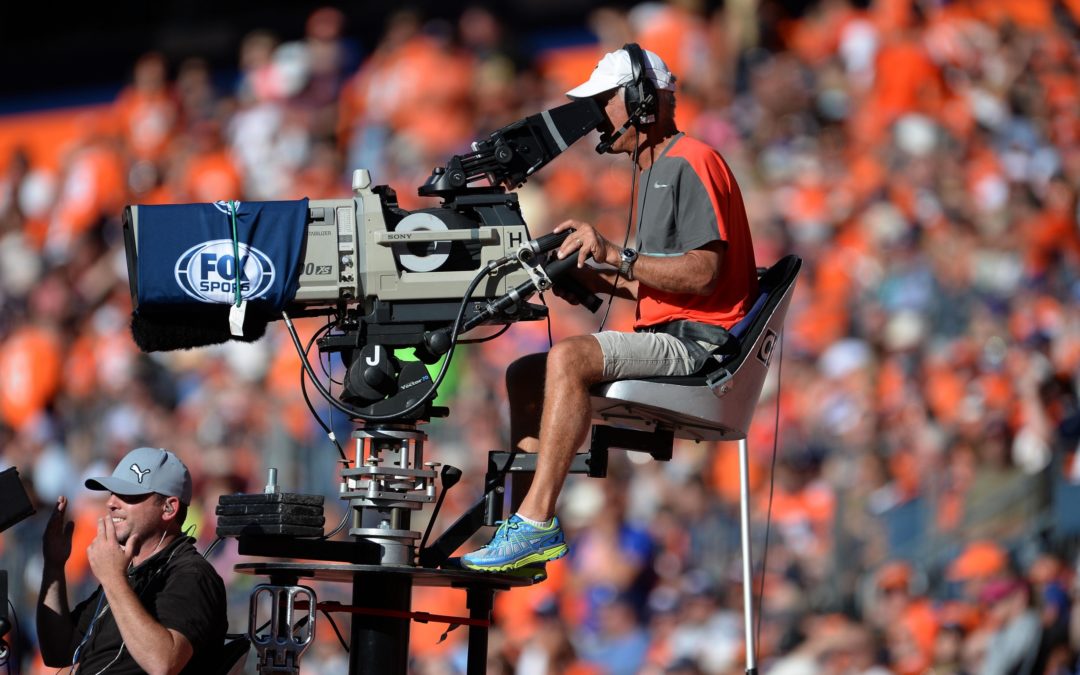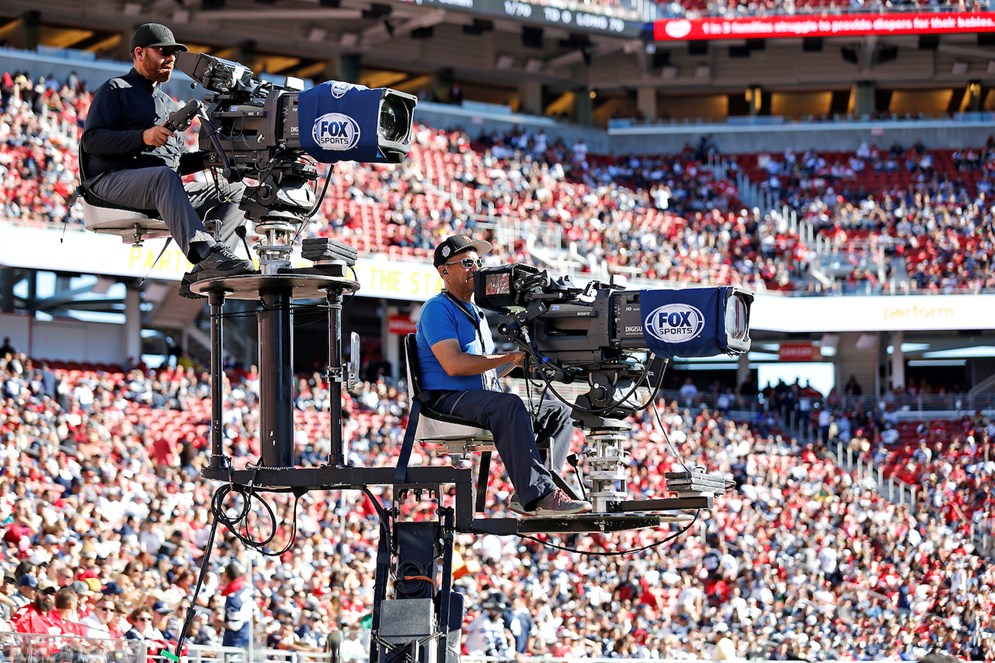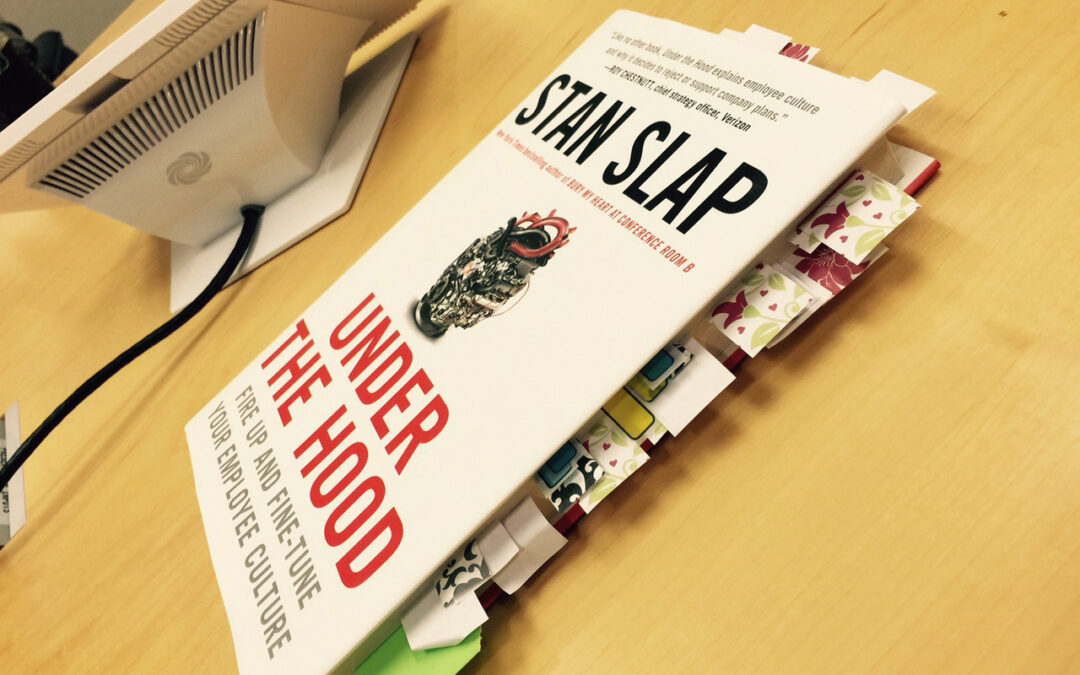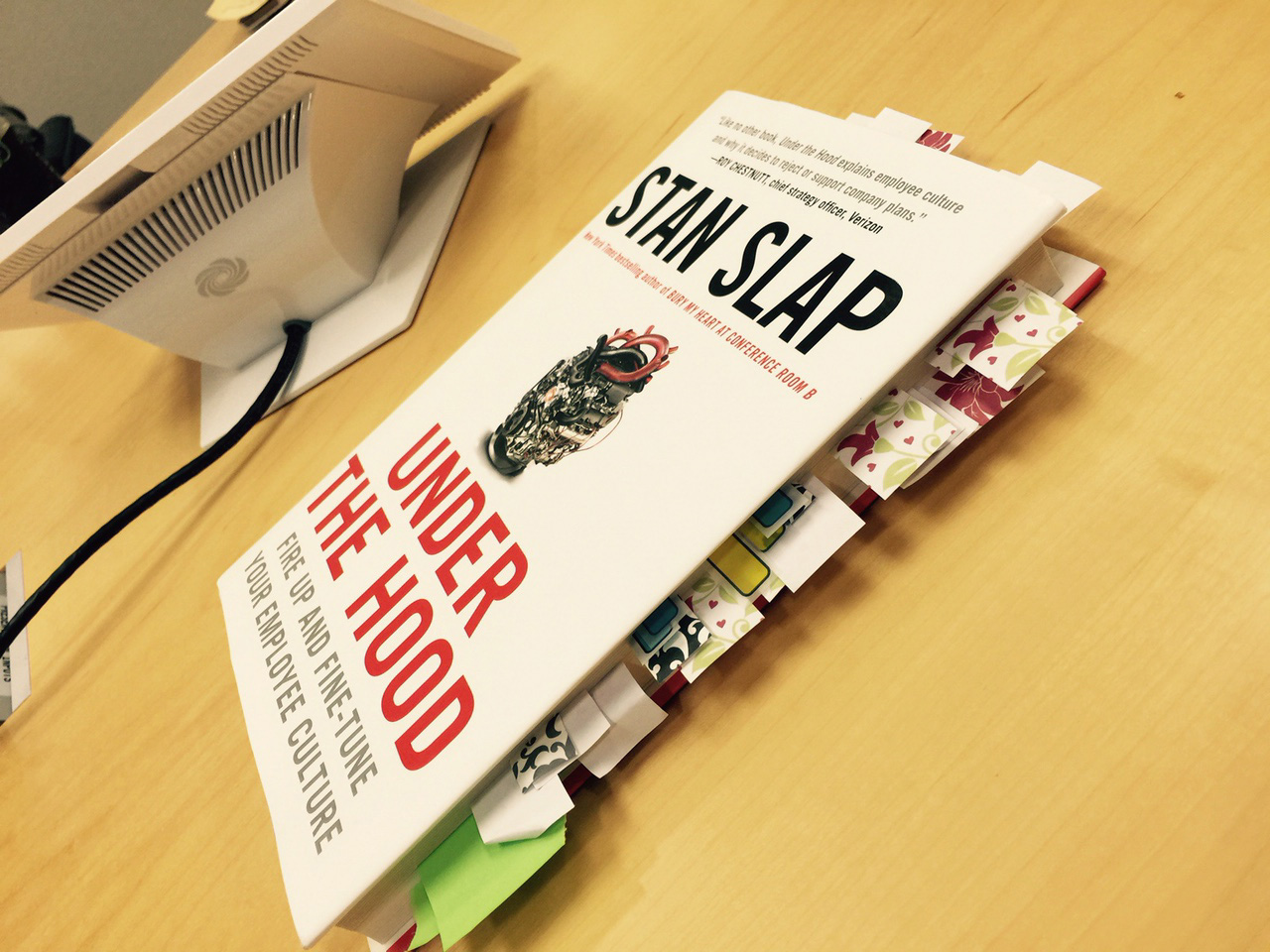
by stanslap | Jan 31, 2020 | Business, Events, Life Stories
When “Sorry, I left the lens cap on” just won’t do.
Filming the Super Bowl and managing your own top talent culture.
Complacency doesn’t just affect employee cultures that are less than competent; it breeds in employee cultures that are extremely competent. Such cultures know they’re the best. They are confident of success, enjoy the regular autonomy they have earned, and are entitled to all the material rewards they receive.
If you manage a culture where there is no learning curve or multiple levels of expertise–people already have to be extraordinarily competent to even do the job–how then do you keep them committed and increase that commitment?
This is a problem I addressed as one chapter in my book Under the Hood: Fire Up and Fine Tune Your Employee Culture. In that chapter I also profiled four examples of organizations that required exclusively top talent as a baseline requirement. One of them is the film crew for the Super Bowl. Here’s the exclusive interview with Super Bowl broadcast director Mike Arnold.

THE NUMBERS THAT MATTER
“Camera 10, back up with the throw. Camera 22, stay with the man in motion. Camera 8, you’ve got this guy, follow him. Camera 15, I need you on coach reaction.”
“I’m talking nonstop for three hours,” says Emmy Award–winner Mike Arnold, lead game director for the NFL on CBS and the director of the Super Bowl. During those three hours, other numbers are talking too: Over 108 million viewers, justifying ad costs of $4 million for 30 seconds and igniting Internet gambling of over $93 million.
Mike Arnold isn’t paying attention to any of those numbers. He is focused on 50. That’s the number of television screens in the eighteen-wheel semi-trailer parked outside the stadium. Inside the trailer, Mike is watching those screens intensely, directing editors, graphics, tape teams, and the camera teams on the field, all of whom are tracking the game as fast as it happens. He is making split-second coverage calls about which picture is going out on the air, live, to 180 countries.
Live. One hundred and eight million people. One hundred and eighty countries. Zero margin for error. This kind of make-it-or-break-it pressure would cause many managers to scream at their people—or to run shrieking for the hills. Not this guy: He’s got the standing heart rate of an iguana.
A BUNCH OF SUPERSTARS WHO NEVER GET THE BALL
A lot of his equanimity has to do with the quality of the team. The rest of it has to do with what little getting upset would accomplish. “They’re all professionals,” he tells me. “I use my own core team of twenty-five, and I cherry-pick the best of the rest. Everyone has been working football all year, so they intuitively understand the rhythm of the game. It’s an honor to work the Super Bowl, and everyone knows it. Everybody wants to do their best.”
“But even superstars need pumping up,” I say. “That’s true,” he agrees, “but I don’t do a lot of rah-rah before the game. I do tell them, ‘Hey, you never know what will be the moment that everybody remembers from this Super Bowl. You could be the cameraman who has that or the tape guy who has the replay. If people remember it, they’re going to remember it for a long time.’ Then counter the pressure by reminding them that once the kickoff happens, it’s the same eleven players on eleven players, and they’ve all done this before.
“The game is going to be the game,” he says. “We can only anticipate so much, and that’s what makes it so exciting to watch. Sure, we can miss a key shot, but to get on my guys for it won’t help and may not be fair. Remember, it’s the quarterback’s job to fake everyone out. I stay positive and supportive. If my guy misses a play, I’m not happy about it, and I may yell instructions, but I’m not yelling at my guy. What’s the point of reprimanding someone in the middle of the action? I need them to focus on the game.”
“Since a percentage of your employee culture is new, how do you rehearse?” I ask. “We don’t just show up on Sunday to cover the game,” he responds. “We watch a lot of films, visit the teams, and hold camera meetings. And then a week before, we bring a high school team into the actual stadium and have them run plays we think are going to happen in the big game, so we can block out camera angles.” “A high school team?” I ask. “Of course, NFL players are a lot faster,” Mike adds. Well . . . yeah.

THE GAME IS ON, THE LIGHTS ARE OFF
“One of the things we do drill for is if someone runs onto the field,” he offers. “Then we have a combustible situation that may be entertaining to some but might also be dangerous.” One of the things that Mike and his team never drilled for is what would happen if someone ran onto the field but they couldn’t tell because nobody could even see the field: the midgame loss of power in Super Bowl 2013.
“That was just surreal,” he says. “Our cameras are shooting up in the lights and suddenly they lose the lights. Hey, what happened? When the lights went, we lost all of that power that went to the lights, which goes to a lot of our cameras, so we lost a bunch of cameras. We lost communications with our announcers in the booth, so they couldn’t hear us. We were just flying blind, but we didn’t panic. It was a fast team response: How do we get the cameras back? How do we fill the air with whatever we can?”
I venture that filming the Super Bowl must be akin to a tightrope walker who wisely doesn’t look down until it’s over. “This is just what we do,” he says, all iguanish. “You know what I’m amazed at? When you go to a restaurant with eight people and your waiter takes an order and doesn’t write anything down. Then he brings it out, and it’s right. How do they do that?”
Excerpted from Under the Hood: Fire Up and Fine-Tune Your Culture by Stan Slap. © 2015 Penguin/Random House, New York
Join the SLAP List
Signing up is free.
Getting off is gonna cost you.

by stanslap | Jun 22, 2017 | Business, Life Stories, Opinion, Values
When wrong is the best way to right.
In the name of hyper-innovation, growth, and ROI/C metrics the enterprise has a never-ending demand for competence from its manager and employee cultures. Could anything be missing in the constant push for topnotch expertise in execution, strategic prowess, product breakthroughs, marketing creativity and other dance moves that allow a company to keep nimbly ahead of its competition and satisfy the many judges of its performance?
Yes, it could. And because irony never sleeps, the path to competence lies in part in embracing incompetence.
I’m not talking about incompetence as an acceptable substitute for competence, or as a relaxation of standards, or as advocating carelessness in managing the business. I’m talking about supporting temporary incompetence in the effort to create something new or master it at a new level. About admiring the elegance of fumbling toward achievement as much as the achievement itself.
It’s not easy to do. The last thing anyone under pressure is going to chance is the counter-intuitive move. Companies and their cultures tend to go with what works even if they know it likely won’t work. There is a race from mistakes toward the next possible victory, skipping the deep post-mortems, and focusing on effect over cause. There’s enough time to place blame but not enough to savor the well intentioned attempt. We shiver when incompetence happens to us and shun others when it happens to them.
Incompetence is a pejorative term in most organizational environments, and a dangerous one at that. “Everyone rises to their level of incompetence,” Laurence J. Peter famously said in The Peter Principle. But before him, Socrates said, “The only true wisdom is in knowing you know nothing.” After him, Zen guru Shunryo Suzuki said, “In the beginner’s mind there are many possibilities, but in the expert’s there are few.”
FOUR THINGS YOU CAN DO RIGHT NOW,
PLUS ONE PERSONAL EXAMPLE.
- FIND SOMETHING YOU KNOW NOTHING ABOUT AND ATTEMPT TO MASTER IT
Return to something that has defeated or intimidated you before. Do it yourself and if you manage a team, do it together.
- STUDY THE INCOMPETENCE OF THE ACCOMPLISHED
Ignore the successes of very accomplished people but study how they dealt with their incompetence getting there and what it taught them that led to enormous success.
- RAISE THE BAR ON WHAT IT MEANS TO BE COMPETENT
Allow yourself and others to act incompetently about certain agreed upon things, like part of a project or goal strategy. Note that this is different than allowing them to be incompetent and that failure is not the same thing as incompetence.
- IF IT’S STILL TOO RISKY ON THE JOB, TRY IT AT HOME
I offer you this example of my own blazing incompetence, to which I am drawn like a moth:
I play the tenor saxophone. Well, I say I play; my wife Diane says I have a saxophone. I’m busy and constantly traveling so can’t practice the way I should. After all the years spent with this instrument I can now play any song ever written – just not intentionally and not twice. I begin to tune up, neighborhood dogs begin to howl and my own gentle Labrador retriever frantically scrambles under the bed, refusing to touch wet food for the next 24 hours.
I really like guitars, have a mighty fine personal collection, and keep a 1957 Les Paul and Marshall half-stack in the lobby of my company’s offices for anyone who is working or visiting and wants to play. Yet I’ve always been drawn to the saxophone. I revere all legends of jazz but this is mostly because of Charlie Parker. His remarkable natural prowess and dauntless vision earned him a reputation as the best alto saxophone player in jazz history, and one of the founding fathers of modern music. If you play music or like music, or maybe have just heard of music, I urge you to listen to him.
I love Parker’s deconstruction and reconstruction of the established mathematics of his field, his unrelenting passionate pursuit of the new, and the profound humanity that infuses his playing. It’s the same way I like to approach what I do in my own company, which is closed on Charlie Parker’s birthday every year as a paid employee holiday.
Where Parker could see entirely new patterns and possibilities in the mist, I see…the saxophone. It’s sitting on the couch in my office as I write this. Completely mocking me. Still, I continue to listen and learn and play whenever I can, recognizing that I’ll never, ever approach the intuitive genius or even basic dexterity of my idol.

And maybe that’s why I dig it. Like so many of you, I have accomplishment as a key personal value, and so badger myself constantly with a never-good-enough mantra. But really, that’s just your basic over achiever nuttiness. In reality, my company’s solutions have been carefully constructed, exhaustively tested and are constantly refined. I surround myself with a team that includes PhD’s and other experts in the disciplines we provide, and my books have been written with superb research teams.
Without being an arrogant snot, I am confident about our competence around here. While each client assignment is new and never taken for granted, what we are going to do for a company we’ve done successfully many times before. These days we are intent on repeating success, not on creating it for the first time. That’s what scaling a business is all about.
Confronting this stubborn brass instrument means attempting an entirely new competency and dealing with the impatience, the setbacks and victories, and the determination that goes along with it. It’s a new source of energy, which helps fuel the energy I bring to my business.
It reminds me of how competency happens in the first place. It reminds me that anything great began as something fearless. And it reminds me never to take the journey to real competency for granted, in anyone. Well, I say the saxophone is an instrument. Diane says in my hands it’s more of a weapon.
_________________________________
TALK TO ME: What are you incompetent in and what has that taught you? Does your company correctly value incompetence and what are examples of the payoff if it does?
_________________________________
Stan Slap is the CEO of SLAP, the international consulting company renowned for achieving maximum commitment in manager, employee and customer cultures – the three groups that decide the success of your company. He is the New York Times bestselling author of Bury My Heart at Conference Room B and Under the Hood. slapcompany.wpengine.com

by stanslap | Mar 21, 2012 | Business, Life Stories, Video Blog


To enter this contest, write a response of at least 200 words to one or more of Stan Slap’s five questions. Your entry must contain truthful accounts of your employee experiences – only legitimate stories will be considered. The use of real names and companies is requested; omission of real names can reduce the chances of being published. Everything you submit will remain confidential unless you provide permission to use it.
Here are the 5 questions.
1. When employees felt respected or disrespected by your company
2. When a new strategy was implemented well or badly
3. How your company responds to your feedback
4. When you’re passionate or bitter about your company
5. Whether your company lives by values
Submit Your Story Here









